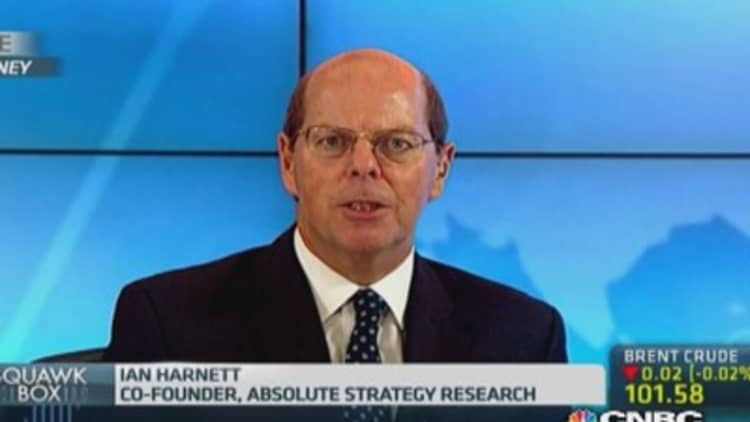
Negative sentiment surrounding Europe has put some investors off the region, but analysts told CNBC U.K. equities still offer an attractive bet.
Ian Harnett, co-founder of Absolute Strategy Research, told CNBC Asia's "Squawk Box" that he had recently re-jigged his global portfolios to reflect an underweight position in European equities, but said it was not necessary to dismiss European equities altogether.
"We would say the U.K. market is the best placed in the European spectrum at the current time, you've got some interesting value plays there," said Ian Harnett, co-founder of Absolute Strategy Research.
Read MoreEurope shares turn positive after Putin comments
Harnett was bullish on global equities overall and said he expected 10 to 15 percent gains this year. He argued that as global stocks start to look more expensive, investors will start seeking out value in places like the U.K.
"And if you look at the U.K. you've got those value stocks... basic resources that are looking very attractively valued and you've also got some nice financial services plays, which is another good way of playing the upside there," he added.
The U.K.'s primary stock market - the FTSE 100 - has been on a rollercoaster to nowhere this year. Performance has been extremely volatile and stocks are now down around 0.5 percent year to date. Meanwhile performance on the EuroStoxx 50 - the euro zone's leading blue chip index - has been poor in recent months amid the escalating Ukraine crisis and weak economic data out of Europe. Stocks are down 7 percent since June 10, although they are up 0.5 percent year-to-date.
Stocks on the FTSE 100 are trading at a 15.64 price-to-earnings ratio, compared to the U.S. S&P 500's 18.41, the German Dax's 14.73, Japan's Nikkei's 18.58.
Read MoreEuropean weakness is an issue for stock market
But the U.K. economy's prospects have noticeably brightened in recent times, following years in the doldrums in the aftermath of the global financial crisis.
Last month, the Office of National Statistics (ONS) said the U.K. economy is now 0.2 percent larger than it was in the first quarter of 2008, after expanding 0.8 percent from April to June on the previous quarter, leading the Chancellor of the Exchequer George Osborne to describe the data as a "milestone", but warning there was still "a long way to go."
Also adding to positive sentiment for U.K. stocks, Bank of England Governor Mark Carney last week tempered interest rate hike expectations - which could be a negative factor for British businesses and their share prices - by saying increases to the bank rate would be gradual and limited.
Henry Dixon, portfolio manager on the U.K. equities team at asset manager GLG, agreed that on a relative basis U.K equities remained attractive, although not as attractive as they have been in the past.
"The market has been slightly overvalued since May of last year but we do think the relative attractiveness of the asset class is very strong and they've only grown over the last week," he told CNBC Europe's "Squawk Box" on Monday.
"The transition we need to make from relative to absolute value can come via two mechanisms: price falls which we've had modestly, and also earnings growth. We feel more constructive about earnings growth in the second half [of the year] particularly given the moves we've had in FX and post comments from Carney last week," he added.
The British pound saw a steady period of strength over the past year, gaining near 15 percent against the greenback from mid-July 2013 to mid-July this year on expectations of a rate hike. However, sterling has weakened 2.7 percent against the dollar over the past month, as those expectations have been pushed out. A stronger pound can prove a headwind for U.K. businesses, as it makes their exports less attractive to foreign buyers.
Read MoreEuro zone growth stagnates, Germany contracts
But other analysts warned of headwinds down the road for U.K. investors.
Analysts at investment bank Julius Baer said in a note that they were maintaining their underweight on U.K. equities, as they saw better opportunities elsewhere. They also flagged concerns about the upcoming Scottish independence vote, the expected monetary tightening and the market's defensive exposure.
On September 18, Scotland will vote on independence from the U.K. If the Scottish people vote for independence that would substantially reduce the size of the U.K. economy, although most opinion polls currently point to a "no" vote.
"There are various factors that support the short-term relief [for U.K. equities] but - in our view - leave only limited room for a positive performance going forward. Therefore, we do not believe in a general change of the trend yet," the Julius Baer analysts said.


